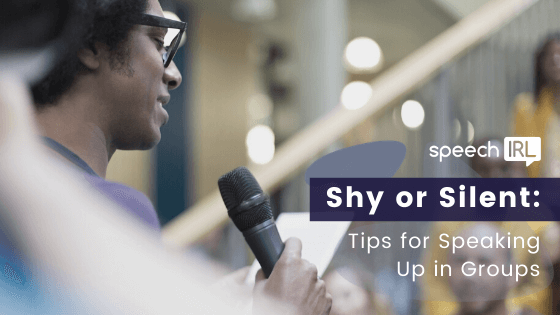by Rachel Muldoon, MSc, CCC-SLP
As long as it took many of us to get acclimated to working from home and practicing social distancing over the past few months, the tide is about to turn. After loneliness, zoom fatigue, and other effects of isolation, we may start to experience a kind of disorientation when we encounter larger groups of people and try to navigate conversations with more than one or two participants. Add in concerns about social distancing, and you may find yourself so distracted by reading social cues and keeping a safe distance that it becomes difficult to follow what’s being said at all, much less interject with your own thoughts and opinions.
Many of us are shy, but when our uncertainty or self-consciousness practically becomes silence, our friends and colleagues can’t tell what we are thinking. Putting your thoughts into words and then saying them out loud is actually a pretty complicated process involving several different brain and nerve functions, even when we’re not emerging from three months on quarantine. As we move forward and start to reconvene and rebuild our communities, we will all experience different feelings about these changes, from anxiety to excitement, and yes, more uncertainty. But we all deserve to participate in the process of regrowth and raise our voices along with the most outgoing personalities among us. Here are some of our best tips for speaking up in groups:
- Challenge yourself. Set a specific, concrete goal to speak just a little bit more. If you have 3 meetings this week, can you contribute once in two of those meetings? More? If you are meeting with friends for dinner, can you join in the conversation at least three times? Know how much you currently contribute, and increase it by a little. If you normally speak up once, or know you will have to speak up once to report on a specific task, challenge yourself to speak up twice. (Don’t push yourself too hard too fast! This will make the goal feel much less manageable). Then if you complete your goal this week, set it a little higher next week.
- Get grounded. This mindfulness tip helps create more mental space for presence and focus. If standing, feel the ground beneath your feet and bend your knees slightly to feel the weight of your whole body. If seated, feel your back against the back of the chair, your bottom down, and your feet in contact with the floor. Rather than feeling light and flighty, getting grounded helps us engage with the conversation at hand, makes us look more confident, and sends signals to our brain that can help us start to physically feel more confident.
- Speak confidently. Mentally prepare to project your voice and over-articulate, then do so! Even if you don't feel confident, speaking with a louder, clearer voice will make you sound more confident. You may in fact begin to feel more confident yourself if you maintain this voice—fake it til you make it is a neurological principle! Tips for projection: pick a person sitting far away, and cast your voice to reach that person.
- Give a non-verbal cue that you want to participate. Speaking of people talking over you, sometimes we are trying so hard to break through our silent barrier, but no one realizes we want to talk (or the other people in the group are hogging the conversation a bit). Try some of these cues to get a word in edgewise: Holding up a hand or a finger. Sitting up and forward more in your chair while looking directly at the person speaking. Pointing towards them. Nodding vigorously or shaking your head vigorously. These actions show that you have strong feelings toward what is being said and have more to contribute.
If the non-verbal cues aren’t working, say “Yeah!” “So...” “Exactly!” “Well…” (see Tip 3 about doing this confidently!). Then the other person can finish their sentence without a complete interruption but know you are the next person waiting to talk.
- Come prepared. If you’re heading into a meeting where you know the topic of conversation, compile some notes ahead of time. If you’re going to meet up with friends, have a few conversation starters prepared, both standard ones (“The weather was so gorgeous today!” “Did you see the football game this weekend?”) and person-specific ones (“How is your sister doing?” “I saw you went on that awesome vacation!”). If it sounds weird to "prepare" for everyday social conversations—it's not. Skilled conversationalists have go-to questions and lines to start conversations and keep them flowing.
- Listen. Even with prepared notes or topics of conversation, it’s hard to maintain a conversation for long if we don’t pay attention to what the group is saying! Also, once you’re listening (really listening and not just hoping they will keep talking so you don’t have to), it can take less mental preparation to think of the next thing to say. However, if you have any intellectual insecurity about what you’re adding to the conversation, it takes intentional focus and discipline to quiet the insecure or scared thoughts going through your own head.
It’s okay to be the quiet one, so long as you feel capable of speaking up when it matters to you. These are a lot of tips—if you're struggling, pick ONE to practice each time you go to a large gathering and see how it goes. There is value in being the quiet voice that speaks up only on occasion; you can be a model for others by listening and sharing what's really important. Your thoughts are valuable. Your words are worth hearing. Give others the gift of listening to you.
We created a free online program for conversation practice at the beginning of the pandemic. We will continue meeting as long as our community needs some extra space to practice small talk! Check it out here.

